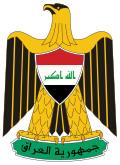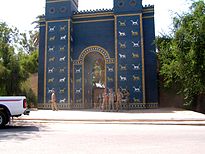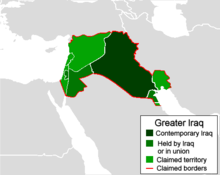- Iraqi nationalism
-
Iraq 
This article is part of the series:
Politics and government of
IraqGovernment- Constitution
- Federal government
- President (List)
- Presidency Council
- Vice Presidents
- Prime Minister (List)
- Cabinet
- Current Government
- Kurdistan Regional Government
Legislative- Council of Representatives
- Speaker
- Kurdistan Parliament
Judicial- Iraqi High Tribunal
- Governorates
- Districts
Elections- Elections
- Electoral Commission
- Jan 2005 parliamentary election
- 2005 governorate elections
- Dec 2005 parliamentary election
- 2009 governorate elections
- 2010 parliamentary election
- Constitutional referendum
Political PartiesForeign Policy
Iraqi nationalism refers to a nationalism based on Iraqi identity. Iraqi nationalism in history was influential in Iraq's movement to independence from Ottoman and British occupation. Iraqi nationalism was an important aspect in the 1920 Revolution against British occupation, and the 1958 Revolution against the British-installed Hashemite monarchy.[1] Iraqi nationalism involves the recognition of an Iraqi identity stemming from ancient Babylonia and Assyria.[2] Iraqi nationalism exists in all of Iraq's communities and expresses a united Iraqi national identity.[3]
Contents
Iraqi nationalist identity and culture
Iraqi nationalism has emphasized Iraq's cultural heritage to ancient Sumer, Babylonia and Assyria, states that are considered the cradle of civilization that spread civilization to other parts of the world.
Babylonian ruler Nebuchadnezzar II and Kurdish Muslim leader Saladin during the Crusades are two important historical figures of Iraq and iconic figures in Iraqi nationalism.
Saddam Hussein as President of Iraq expressed himself as an Iraqi in state art - associating himself as a modern-day Nebuchadnezzar II and wearing both Arabic and Kurdish headgear in such art.[4] Saddam Hussein also paralleled himself and the Ba'athist government to Saladin, the famous Iraqi Kurdish leader of Muslims and Arabs against Crusaders in Jerusalem, who was from Iraq.[5][6]
Irredentism
Some Iraqi nationalists have held irredentist claims to the Iraqi Arab-populated province of Khuzestan in Iran, Kuwait, and a small territory in Saudi Arabia formerly part of the Saudi–Kuwaiti neutral zone as natural and historical parts of Iraq.[7] After gaining independence in 1932, the Iraqi government immediately declared that Kuwait was rightfully a territory of Iraq, as it had been part of an Iraqi territory until the British creation of Kuwait after World War I and thus stated that Kuwait was a British imperialist invention.[8] Iraqi and pan-Arab nationalists during World War II promoted merging the Vichy French mandates of Lebanon and Syria along with the British mandate in Palestine and Transjordan together with Iraq into a single state.[9] Iraqi nationalist and pan-Arab nationalist Nuri Pasha was known by 1949 to have supported integrating Iraq and Syria together into a single state.[10]
See also
References
- ^ Bengio, Ofra. Saddam's Word: Political Discourse in Iraq. New York, New York, USA: Oxford University Press, 1998. Pp. 117-118.
- ^ Reich, Bernard. Political leaders of the contemporary Middle East and North Africa: A Bibliographical Dictionary. Westport, Connecticut, USA: Greenwood Press, Ltd, 1990. Pp. 245.
- ^ Reich, Bernard. Political leaders of the contemporary Middle East and North Africa: A Bibliographical Dictionary. Westport, Connecticut, USA: Greenwood Press, Ltd, 1990. Pp. 245.
- ^ Reich, Bernard. Political leaders of the contemporary Middle East and North Africa: A Bibliographical Dictionary. Westport, Connecticut, USA: Greenwood Press, Ltd, 1990. Pp. 245.
- ^ Kiernan, Ben. Blood and Soil: A World History of Genocide and Extermination from Sparta to Darfur. Yale University Press, 2007. Pp. 587.
- ^ Galaty, Michael L; Charles Watkinson, Charles. Archaeology under dictatorship. New York, New York, USA: Kluwer Academic/Plenum Publishers, 2004. Pp. 204.
- ^ Miller, Robert S. America's Disposable Soldiers: The Real Truth Behind Gulf War Illness. Victoria, British Columbia, Canada: Hikma Books, 2002. Pp. 260.
- ^ Duiker, William J; Spielvogel, Jackson J. World History: From 1500. 5th edition. Belmont, California, USA: Thomson Wadsworth, 2007. Pp. 839.
- ^ Louis, William Roger. The British Empire in the Middle East, 1945-1951: Arab Nationalism, the United States, and Postwar Imperialism. New York, New York, USA: Oxford University Press. Pp. 313.
- ^ Louis, William Roger. The British Empire in the Middle East, 1945-1951: Arab Nationalism, the United States, and Postwar Imperialism. New York, New York, USA: Oxford University Press. Pp. 308.
Categories:- Nationalist movements
- Politics of Iraq
Wikimedia Foundation. 2010.



